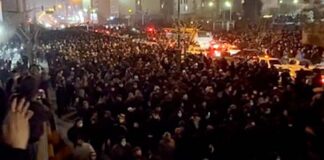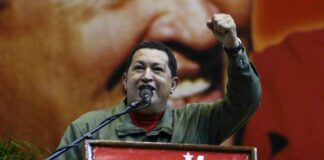There has been a surge in civilian casualties in Iraq, as US bombing intensifies in the city of Mosul.
The Airwars website, which is tracking US operations in Iraq and Syria, estimates that at least 1300 people were killed in Mosul in March alone.
Despite direct Australian participation in the bombing, these civilian casualties are all but ignored by the Australian media.
On 17 March, a probable coalition airstrike killed up to 300 people in a residential neighbourhood in West Mosul.
Wa’ad Ahmad al-Tai told Amnesty International, “We were all huddled in one room at the back of the house, 18 of us, three families. But when the house next door was bombed, it collapsed on us… My son Yusef, nine, and my daughter Shahad, three, were killed, together with my brother Mahmoud, his wife Manaya and their nine-year-old son Aws, and my niece Hanan.”
Iraqi military officials blamed the deaths on Islamic State booby traps.
But the US admitted it had bombed the location and Lt. Gen. Stephen Townsend, the top US general co-ordinating the operation against Islamic State, said there was “at least a fair chance” it was responsible.
At the end of December, at least seven people were killed when a warplane bombed the city’s Ibn-Al-Athir hospital compound. It was the second time a Mosul hospital had been hit.
Iraq’s emergency response division, a special police unit, is firing inaccurate rockets into densely populated areas. These weapons are commonly known as improvised rocket-assisted munitions (IRAM). Human Rights Watch have criticised them as “inherently indiscriminate”, quoting eye-witnesses saying these weapons are being used repeatedly by Iraqi police.
The civilian casualties will only create more bitterness amongst Mosul’s Sunni population against the Shia-dominated government.
Since the operation to re-capture Mosul from Islamic State began in October last year, coalition forces have simply advised the city’s residents to remain in their homes.
But in the face of the increasing casualties and desperation, thousands are fleeing. In early March 4000 left the city every day, according to the UN. In all, over 200,000 people are displaced, according to an International Organisation for Migration report.
Many are moved into over-crowded refugee camps. “There are four families in this tent, about 30 people sleep in it,” said 25-year-old Marwan Nayef, at the Hammam al-Alil camp south of Mosul.
UN Secretary General Antonio Guterres admitted, “We don’t have the resources that are necessary to support these people”, after visiting Iraq in March.
Sectarianism
Since February, Shia militias known as the “Popular Mobilisation Units” have again been detaining and screening residents as they flee, in an effort to determine if they are members of Islamic State. In the operation against Fallujah last year, they were accused of kidnap and torture in similar operations against residents leaving the town.
Previously the militias have carried out a reign out of terror in Sunni areas re-captured from Islamic State, looting property and demolishing homes and businesses.
This is despite promises when the operation against Mosul began from Iraqi Prime Minister Haider al-Abadi that the militias would not enter the city.
The involvement of Iraq’s Shia militias will alienate the Sunni people of Mosul and entrench the sectarianism that led to Islamic State’s rise in the first place.
The US and its coalition allies are directly responsible for the rise of sectarianism in Iraq. They sought to engineer sectarian tensions to divide and weaken opposition to the US occupation forces from 2004 onwards.
Faced with a rebellion that united Shia and Sunni Muslims, the US opted for a strategy that carved up state institutions and handed them over to sectarian religious parties. The Iraqi government remains controlled by one of these Shia parties.
There was rightly widespread denunciation of the Syrian and Russian destruction of Aleppo, a key rebel-held city in Syria. But the civilian deaths in Mosul at the hands of the West should also be condemned. The US, with Australian support, has been the architect of Iraq’s destruction and its descent into an abyss of ongoing warfare.
The same coalition of Western forces that now claim to be liberating Mosul are the ones that invaded Iraq in 2003, killing hundreds of thousands of people.
The only solution lies in working class people in the Middle East rising up across the sectarian divide against imperialism, their own despots and Islamic State.
By Tom Orsag and James Supple





